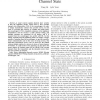Free Online Productivity Tools
i2Speak
i2Symbol
i2OCR
iTex2Img
iWeb2Print
iWeb2Shot
i2Type
iPdf2Split
iPdf2Merge
i2Bopomofo
i2Arabic
i2Style
i2Image
i2PDF
iLatex2Rtf
Sci2ools
117
Voted
GLOBECOM
2010
IEEE
2010
IEEE
Providing Secrecy Irrespective of Eavesdropper's Channel State
A usual concern against physical layer security is that the legitimate parties would need to have (partial) channel state information (CSI) of the eavesdropper in order to design transmission schemes that provide secrecy. In this work, to overcome this concern, we consider the model where the eavesdropper's CSI is completely unknown at the legitimate transmitter(s) and the receiver. A static channel setting, and multiple antennas are considered for all parties, and it is assumed that the eavesdropper has perfect self-CSI. In this setting, assuming that the legitimate parties can employ a larger number of antennas than the eavesdropper, we provide a positive secure communication rate in the sense of strong secrecy. The achievable (guaranteed) secrecy rate we derive for the MIMO wiretap channel matches its converse in terms of secure degrees of freedom. As a side result of our approach, we also derive the secure degrees of freedom region for the MIMO MAC-wiretap channel where the tr...
Related Content
| Added | 11 Feb 2011 |
| Updated | 11 Feb 2011 |
| Type | Journal |
| Year | 2010 |
| Where | GLOBECOM |
| Authors | Xiang He, Aylin Yener |
Comments (0)

